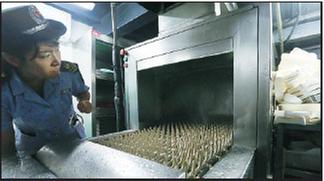Beijing looking for restaurants with unhygienic kitchens
By Cao Yin | China Daily | Updated: 2017-08-28 07:27
| An inspector from the Beijing Food and Drug Administration checks the condition of a Haidilao restaurant's kitchen in Beijing on Friday, soon after a report that it was unhygienic.Cao Boyuan / For China Daily |
Beijing's food safety watchdog has begun a two-week sanitation inspection of the city's restaurants, following news reports that two Beijing branches of a popular hotpot chain were unhygienic.
The Beijing Food and Drug Administration announced the inspection over the weekend, saying its main targets will be restaurant chains, canteen suppliers and establishments with previous food safety problems.
"Business licenses, dishwashers, sanitation equipment and pest and disease control are the focus of the inspection," said Duan Zhiyong, director of the administration's supervision department.
Legal Evening News, a Beijing newspaper, reported on Friday that the operations of two Beijing branches of Haidilao, a popular hotpot chain with restaurants in about 60 Chinese cities, were unsanitary.
Videos taken by hidden cameras showed rat-infested kitchens, a dishwasher caked with oily food residue and a worker trying to fix a sewage blockage with a soup ladle.
The hotpot chain, which originated in Jianyang, Sichuan province, admitted its management faults and apologized in a public statement issued on Friday afternoon.
The administration has launched a safety check on all branches of the hotpot chain in the city and talked to representatives of the company on Saturday.
"We've also ordered Haidilao to open its kitchens to the public in a month and report its overhaul measures," the statement said, adding that the chain's sanitation rating will be downgraded.
Fan Jing, a Beijing native and a hotpot fan, applauded the inspection, "because food safety must take priority in a restaurant's operation". But she said the inspection should be extended to small canteens in the city.
"Food safety checks in supermarkets or big restaurants are common, but grocery stores with some safety risks in communities are rarely inspected," she said.
Li Xiaoou, another Beijing native, said the administration should disclose the inspection results in a timely manner online, to help residents know about problems and which restaurants are unhygienic.
"After all, we cannot check whether a restaurant's kitchen is clean or not when we eat there. What we rely on is the authorities' increasing supervision, and self-inspections by the restaurants," he said.
Xinhua contributed to this story.

























